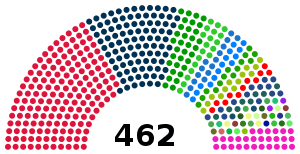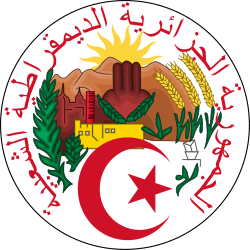People's National Assembly
The People's National Assembly (al-Majlis al-Sha'abi al-Watani), abbreviated APN, is the lower house of the Algerian Parliament. It is composed of 462 members directly elected by the population. Of the 462 seats, 8 are reserved for Algerians living abroad.[2] Members of the People's National Assembly are directly elected through proportional representation in multiple-member districts and serve terms lasting five years at a time. The last election for this body was held on 17 May 2017.[2] This body and of the Algerian Parliament is seen as nonrepresentative of the Algerian people's interest because of the presidency, which controls the majority of governmental power.[3] The minimum age required for election into the APN is 28.[4]
People's National Assembly المجلس الشعبي الوطني Asqamu Aɣerfan Aɣelnaw | |
|---|---|
_Logo.svg.png) | |
| Type | |
| Type | of the Parliament of Algeria |
| History | |
| Founded | September 1962 |
| Leadership | |
President of the Assembly | Slimane Chenine[1] since 10 July 2019 |
| Structure | |
| Seats | 462 members |
 | |
Political groups | Government (261)
Opposition (100) Crossbench (61)
|
| Elections | |
| Direct election | |
Last election | 4 May 2017 |
Next election | 2022 |
| Meeting place | |
.jpg) | |
| Algiers | |
| Website | |
| www | |
 |
|---|
| This article is part of a series on the politics and government of Algeria |
|
|
|
Constitution
|
|
Executive
|
|
There are 48 districts, called wilayat, in Algeria and 4 overseas constituencies which send representatives to this body.[3] There is one seat for every 80,000 inhabitants and an additional seat for additional citizens in a wilaya numbering above 40,000.[4] The current speaker of the APN is Slimane Chenine , a member of opposition parties. The minimum age to vote in Algeria is 18. Voting is not compulsory.[5]
History
The first election for the People's National Assembly was held on 20 September 1962. In 1963, the President of the Republic of Algeria, Ahmed Ben Bella, halted the activities of the APN and set up a Revolution Council lasting from 1965 to 1976.[5] The APN was reestablished in 1976 with the passage of Algeria's new constitution, at the time only a unicameral legislature.[6] Up until 1991, the ruling party was the National Liberation Front (FLN), and in fact, the 1976 Algerian constitution considered the FLN as the preferred Algerian political party.[6] The first APN election with multiple parties was held in December 1991. After a predicted Islamic Salvation Front (FIS) victory, a fundamentalist opposition party, the Algerian People's National Armed Forces canceled the elections.[4][7] A substitute legislative body, the National Consultative Council, was established in April 1992 and lasted until May 1994, when the National Transitional Council ruled for until the next elections, held on 5 June 1997.[4] In 1996, the legislature split into two chambers forming the Algerian Parliament with the ratification of a new constitution.[6]
References
- "Islamist leader elected new speaker of Algeria parliament". Al Jazeera. 11 July 2019. Retrieved 11 July 2019.
- "Algeria". cia.gov. Archived from the original on 10 November 2016. Retrieved 9 November 2016.
- "People's National Assembly Elections in Algeria" (PDF). cartercenter.org. May 2012. Archived (PDF) from the original on 10 November 2016. Retrieved 9 November 2016.
- "Algeria, Elections and Parliament". Medea Institute. Archived from the original on 10 November 2016. Retrieved 9 November 2016.
- "Algeria, State Institutions". Medea Institute. Archived from the original on 10 November 2016. Retrieved 9 November 2016.
- "Algeria - Government". GlobalSecurity.org. Archived from the original on 10 March 2014. Retrieved 9 November 2016.
- "Algeria". European Forum for Democracy and Solidarity. 21 January 2016. Archived from the original on 24 January 2014. Retrieved 9 November 2016.
- "A future in politics for women in Algeria". UNDP. Retrieved 21 June 2020.
See also
- List of Presidents of the People's National Assembly (Algeria)
- Parliament of Algeria
- Council of the Nation
- Politics of Algeria
- List of legislatures by country